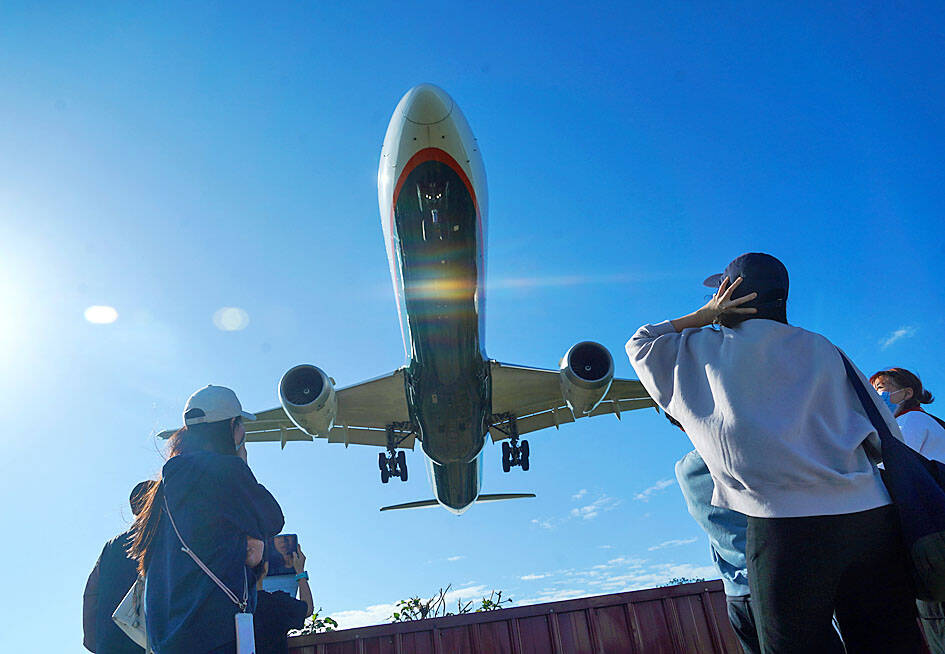Taiwan last year electrified 25 percent of public buses serving urban areas, a milestone on the path to Taiwan achieving net zero carbon emissions by 2050, the Ministry of Transportation and Communications said yesterday.
The push to make public buses electric was part of a NT$64.3 billion (US$1.96 billion) plan launched in 2023 to electrify buses, the ministry wrote in a report to the legislature’s Transportation Committee.
The project’s aim is to subsidize commercial bus operators to add 14,500 electric vehicles (EV) to their fleets to replace diesel-powered buses or as new purchases by 2030, it said.

Photo: CNA
As of November, the ministry has provided funding for 2,080 urban electric buses, of which 1,926 have been operationally certified, achieving last year’s target, the ministry said.
Officials installed 10,086 public charging points consisting of 7,681 slow-charging points and 2,405 fast-charging points to serve 92,166 private EVs, it said.
That means Taiwan reached the EU’s recommendation of 9.1 charging points for every privately owned EV, it said.
The nation has 23 fast-charging stations at 15 freeway service areas and one rest area, which have combined capacity to recharge 154 vehicles simultaneously, the ministry said.
A carbon footprint labeling program for enterprises in the logistics and transportation sectors that started last year provided eight classes and 21 conferences, it said.
A separate trial run with different training courses and guidance services for operators is to start this year and be expanded in the following years, it said.
Taiwan is planning to import sustainable aviation fuel for commercial airplanes and begin domestic production next year, the ministry said.
Sustainable fuel is derived from recycled biological materials.
The fuel later this year would be introduced to domestic airlines accessing Taipei International Airport (Songshan airport), Kaohsiung International Airport and Taiwan Taoyuan International Airport, the ministry said.
By 2030, sustainable fuels should comprise 5 percent of total domestic aviation fuel consumption, if all goes according to plan, it said.
The Ministry of Economic Affairs said in the report that it has established national standards to certify sustainable aviation fuel.
CPC Corp, Taiwan (台灣中油) is tasked with producing aviation-grade biofuel for long-term use, it said.
Taiwan should aim to substitute 10 percent of its aviation fuel consumption with biofuel, the National Science and Technology Council said.
Taoyuan airport consumes 3 million kiloliters of aviation fuel a year, it added.
Last year, the government cut emissions at airports by supplying power and air-conditioning to parked airplanes via air bridges, adding solar panels and supplying ground crew with EVs, it said.
Taoyuan airport replaced 35.7 percent of its ground support vehicles and installed 43 charging points for their use, the ministry said.
Taoyuan airport plans to increase the number of charging points to 70 by 2027, it said.

Taiwan is projected to lose a working-age population of about 6.67 million people in two waves of retirement in the coming years, as the nation confronts accelerating demographic decline and a shortage of younger workers to take their place, the Ministry of the Interior said. Taiwan experienced its largest baby boom between 1958 and 1966, when the population grew by 3.78 million, followed by a second surge of 2.89 million between 1976 and 1982, ministry data showed. In 2023, the first of those baby boom generations — those born in the late 1950s and early 1960s — began to enter retirement, triggering

ECONOMIC BOOST: Should the more than 23 million people eligible for the NT$10,000 handouts spend them the same way as in 2023, GDP could rise 0.5 percent, an official said Universal cash handouts of NT$10,000 (US$330) are to be disbursed late next month at the earliest — including to permanent residents and foreign residents married to Taiwanese — pending legislative approval, the Ministry of Finance said yesterday. The Executive Yuan yesterday approved the Special Act for Strengthening Economic, Social and National Security Resilience in Response to International Circumstances (因應國際情勢強化經濟社會及民生國安韌性特別條例). The NT$550 billion special budget includes NT$236 billion for the cash handouts, plus an additional NT$20 billion set aside as reserve funds, expected to be used to support industries. Handouts might begin one month after the bill is promulgated and would be completed within

NO CHANGE: The TRA makes clear that the US does not consider the status of Taiwan to have been determined by WWII-era documents, a former AIT deputy director said The American Institute in Taiwan’s (AIT) comments that World War-II era documents do not determine Taiwan’s political status accurately conveyed the US’ stance, the US Department of State said. An AIT spokesperson on Saturday said that a Chinese official mischaracterized World War II-era documents as stating that Taiwan was ceded to the China. The remarks from the US’ de facto embassy in Taiwan drew criticism from the Ma Ying-jeou Foundation, whose director said the comments put Taiwan in danger. The Chinese-language United Daily News yesterday reported that a US State Department spokesperson confirmed the AIT’s position. They added that the US would continue to

One of two tropical depressions that formed off Taiwan yesterday morning could turn into a moderate typhoon by the weekend, the Central Weather Administration (CWA) said yesterday. Tropical Depression No. 21 formed at 8am about 1,850km off the southeast coast, CWA forecaster Lee Meng-hsuan (李孟軒) said. The weather system is expected to move northwest as it builds momentum, possibly intensifying this weekend into a typhoon, which would be called Mitag, Lee said. The radius of the storm is expected to reach almost 200km, she said. It is forecast to approach the southeast of Taiwan on Monday next week and pass through the Bashi Channel